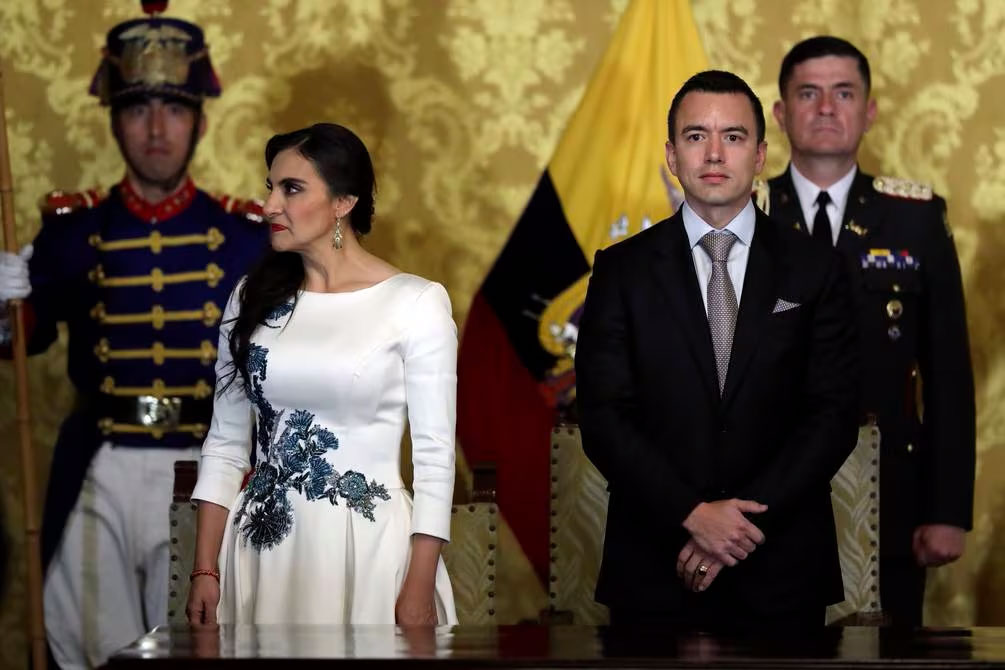President Daniel Noboa has intensified the estrangement within the Executive Branch by issuing a decree to overhaul the role of Vice President Verónica Abad. This restructuring, outlined in Executive Decree No. 30, places the Ministry of Labor and the National Planning Secretariat in charge of implementing the changes, signaling a significant reduction in the responsibilities assigned to Vice President Abad.
President Noboa’s decree, signed on November 24th, specifies that Vice President Abad’s sole function will be to act as “a collaborator for peace and prevent the escalation of conflict between Israel and Palestine.”
This directive involves her relocation to the Ecuadorian Embassy in Tel Aviv, with the precise commencement date left unspecified.
Following this assignment, President Noboa further decreed an institutional restructuring of the Vice Presidency under the principles of austerity in public spending.
Article 141 of the Constitution serves as the legal foundation for President Noboa’s decision, attributing responsibility for public administration to him. Additionally, Article 147 outlines his powers and duties, including the authority to issue decrees for the integration, organization, regulation, and control of the administration in a deconcentrated manner.
President Noboa justifies the specific task assigned to Vice President Abad under Article 149 of the Constitution, which mandates that she exercise functions designated by the President of the Republic. The restructuring also finds support in Article 243 of the Organic Administrative Code, granting the president the authority to restructure procedures for the provision of public goods and services within the central public administration.
Will she go?
Despite the profound implications of this restructuring, Vice President Abad has not issued a direct response to President Noboa’s decision. Notably, the Embassy of Israel in Ecuador, along with the United States, Russia, and China, have expressed approval of President Noboa’s actions.
In an interesting turn of events, Vice President Abad utilized the occasion of the ‘International Day for the Elimination of Violence Against Women’ to convey a powerful message via a 58-second video on the social network X.
While not explicitly addressing President Noboa or the government, she alluded to the concept of violence extending beyond physical harm, encompassing verbal degradation, intimidating actions, and the abuse of power.
“Violence is not just killing others. There is violence when we use a degrading word. When we make gestures to despise other people. When with bad actions they intimidate your children and force you to keep quiet about injustices. When we obey out of fear. When, abusing power, they minimize you and send you to die in war,” said Abad.
This indirect response suggests a nuanced stance on her part, possibly indicating resistance to the restructuring.
Constitutional and diplomatic experts assert that Vice President Abad has the option to refuse the assigned task without facing consequences beyond being left without a specific function. This refusal would not provide grounds for impeachment, and she would retain the prospect of replacing President Noboa when necessary.
A statement from the Communication Secretariat of the Presidency (Secom) emphasizes that President Noboa’s decision represents a historic commitment to international peace and reinforces Ecuador’s dedication to promoting stability in a region plagued by prolonged conflicts.
Abad’s role severely diminished when compared to past VPs
The strained relationship between President Noboa and Vice President Abad dates back to the electoral campaign, reaching an extreme point on the day of their inauguration. On that occasion, Vice President Abad’s absence at the lunch in President Noboa’s honor, opting instead to eat at the Iñaquito market, underscored the discord between the two.
Over the past two decades, Ecuador has witnessed nine vice presidents, each with distinct responsibilities. However, Vice President Abad’s situation stands out as she is the only one compelled to change residence and engage in diplomatic matters. The functions assigned to previous vice presidents have traditionally focused on managing strategic sectors, implementing policies for vulnerable populations, and overseeing popular consultations.
Looking back at the roles of Ecuadorian vice presidents over the last 20 years provides a contextual understanding of Vice President Abad’s unique situation. Alfredo Palacio, for instance, assumed responsibilities in social areas, science, technology, and disaster prevention during his term. In contrast, Vice President Alejandro Serrano Aguilar directed social policy and collaborated in the popular consultation process.
Lenín Moreno, during his vice presidency, presided over the National Council on Disabilities and played a crucial role in various sectors, including the Civil Registry system, tourism promotion, and the National System of Science and Technology.
Jorge Glas Espinel coordinated policies in strategic sectors and oversaw the change in the productive matrix, with his responsibilities extending to ministries such as Electricity and Renewable Energy, Telecommunications, Agriculture, and Transportation.
Subsequent vice presidents, including María Alejandra Vicuña, Otto Sonnenholzner, and María Alejandra Muñoz, were assigned diverse responsibilities, ranging from popular consultation supervision to international coordination and the implementation of the 2030 Agenda for Sustainable Development.
As the latest addition to this lineage, Vice President Verónica Abad faces a distinctive mandate involving diplomatic engagement to mitigate conflicts between Israel and Palestine. Despite the celebratory tone from the government, the unprecedented nature of this assignment raises questions about the motivations behind President Noboa’s decision and its implications for the dynamics within the Executive Branch.
President Noboa’s restructuring of the Vice Presidency, particularly the assignment of a singular diplomatic function to Vice President Abad, signifies a significant shift in the traditional roles of Ecuadorian vice presidents. The implications of this decision extend beyond diplomatic concerns, raising broader questions about the balance of power within the Executive Branch and the evolving nature of Ecuador’s political landscape.


0 Comments